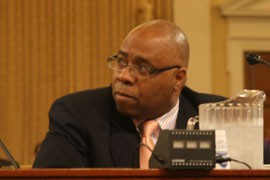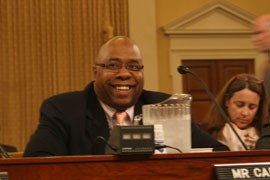Cronkite News has moved to a new home at cronkitenews.azpbs.org. Use this site to search archives from 2011 to May 2015. You can search the new site for current stories.
DES director touts Arizona’s efforts to reform social-service programs
WASHINGTON – The director of Arizona’s Department of Economic Security told a House subcommittee Wednesday that money’s not the problem when it comes to the welfare system – the system is.
Clarence Carter cited Arizona’s efforts to “reinvent” and streamline its social-service system to give recipients greater incentive to get off public assistance, and to give bureaucrats more incentive to help them.
His testimony to the House Ways and Means Subcommittee on Human Resources came as part of the subcommittee’s third hearing on welfare reform. Wednesday’s hearing was called to look at ways that state welfare agencies have used flexibility from federal bureaucrats to improve the safety net for poor people in their states.
Carter told the committee that the biggest problem he sees is the lack of a shared objective among the many programs aimed at helping the poor.
While his department has authority over more than 40 safety-net programs, each is designed and operated with a specific purpose that is difficult to change. Each has its own objectives, rules and funding, Carter said.
That “significantly hinders any ability to have a comprehensive, integrated approach to the health and well-being of our citizenry,” Carter said in his written testimony.
“It’s not a lack of expenditures” but a lack of an overarching vision, Carter told the lawmakers.
Rep. Dave Reichert, R-Wash., agreed, saying that during his time as a sheriff in Washington he encountered similar problems. Having no shared vision leads to no results, said Reichert, the chairman of the subcommittee.
Carter pointed to the limited objectives of many programs as a primary problem, saying that many simply give benefits to people if they fit a certain criteria.
“There is no exit strategy designed” for recipients to move past getting the benefits, he said.
“There must be an objective beyond simple coordination and the receipt of benefits,” he said in his statement.
He said Arizona is attempting to deal with the problem by overhauling the department’s operations according to several underlying principles: Unify the goals of different programs and develop metrics and outcomes with the aim of making recipients self-reliant.
Carter said these principles serve as the building blocks for creating a new, cohesive system that he believes will reinvent the Arizona safety net.
He has enlisted the help of a “state governance group” that includes representatives from all the agencies that administer safety-net programs, as well as a seven-member advisory board of college professors who offer advice on implementing the vision.
He said there is also a team of policy leaders from various federal agencies that will work with the state to help address the current challenges. Carter was in Washington earlier this summer meeting to talk about his plan with officials of different agencies, who may have to grant waivers for some of his proposals.
Several Republicans on the subcommittee were enthusiastic about the plan, with one calling it a step toward helping to maintain the nuclear family.
“The realization of this idea that I am sharing with you today, is somewhere in the distant future,” Carter’s testimony said, “but the time to start is now.”








